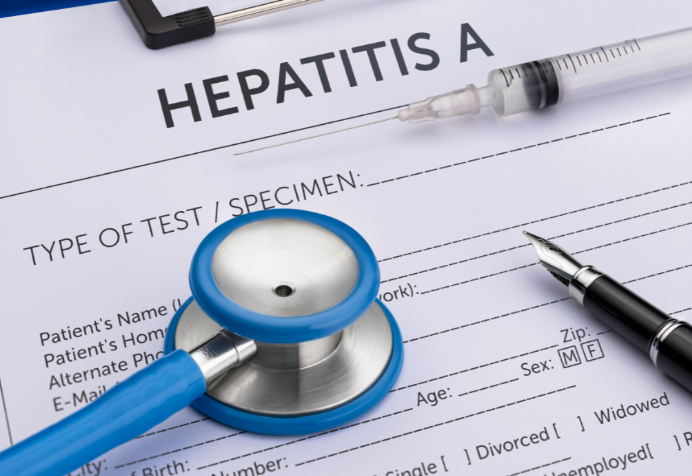Çfarë është hepatiti viral A?
Hepatiti viral A është një sëmundje e mëlçisë me origjinë virale që mund të ketë një ecuri të lehtë dhe të rëndë.
Faktet themelore për hepatitin A:
- Virusi i hepatitit A (HAV) transmetohet duke ngrënë ushqim ose ujë të kontaminuar.
- Rreziku i infeksionit me HGA lidhet me mungesën e ujit të sigurt dhe kanalizimeve dhe higjienës së dobët (për shembull, për shkak të duarve të pista).
- VHA vdes pas 5 minutash zierje. Në temperaturën e dhomës në një mjedis të thatë, ruhet për një javë, në ujë - nga 3 deri në 10 muaj, në feces - deri në 30 ditë.
- Pothuajse të gjithë të infektuarit shërohen plotësisht nga HGA, por herë pas here ka raste kur pacientët vdesin nga forma fulminante (rrufeja) e HGA.
- Imuniteti i përjetshëm formohet pas transferimit të sëmundjes në HGA.
- Ekziston një vaksinë e sigurt dhe efektive për të parandaluar infeksionin HGA.
Si të merrni hepatitin A?
Rruga e infeksionit është fekalo -orale, përkatësisht:
- konsumimi i ujit ose ushqimit të kontaminuar, i cili mund të përmbajë grimca të feçeve të personave të infektuar të padukshme për syrin;
- mosrespektimi i higjienës personale;
- në familje, kur një person i infektuar përgatit ushqim për të gjithë anëtarët e familjes;
- disa lloje të marrëdhënieve seksuale.
Cilat janë simptomat e sëmundjes?
Periudha e inkubacionit të VHA (periudha nga momenti i infektimit deri në shfaqjen e manifestimeve të para klinike) zakonisht zgjat 14-28 ditë. Simptomat e HGA mund të jenë të lehta dhe të rënda.
Simptomat më të zakonshme të HGA:
- dobësi e përgjithshme e shprehur dhe lodhje e shtuar;
- rritja e temperaturës së trupit;
- humbje e oreksit;
- diarre;
- të vjella;
- ndjesi të pakëndshme në stomak;
- rëndim në hipokondriumin e duhur;
- errësimi i urinës (në ngjyrën e birrës);
- Verdhëza (zverdhja e sklerës dhe lëkurës) - shfaqet në 70% të të rriturve.
Megjithatë, jo të gjithë personat e infektuar i shfaqin të gjitha këto simptoma.
Si të mbroheni nga hepatiti A? Qendra e Shëndetit Publik të Ministrisë së Shëndetësisë së Ukrainës këshillon:
- Ndiqni rregullat e higjienës personale: lani duart para se të hani dhe pas çdo vizite në tualet.
- Pini vetëm ujë të valuar: duhet të zihet për të paktën 10 minuta.
- Lani mirë perimet, frutat, zarzavatet dhe manaferrat para përdorimit.
- Mos u vetë-mjekoni. Vetëm një mjek mund të diagnostikojë hepatitin A viral dhe të japë rekomandime për regjimin dhe trajtimin.
- Disa vaksina të injektueshme të hepatitit A janë të disponueshme në treg, përkatësisht Havrix (vaksina e hepatitit A) dhe Twinrix (vaksina e kombinuar e hepatitit A dhe hepatitit B). Prodhuesit rekomandojnë dy doza të vaksinës për të siguruar mbrojtje më të gjatë pas vaksinimit (5-8 vjet). Nuk ka vaksina të licencuara për fëmijët nën një vjeç. Në vendet me endemi të lartë, përdorimi i vaksinës është i kufizuar sepse shumica e popullsisë së rritur ka imunitet natyror si rezultat i ekspozimit të mëparshëm ndaj sëmundjes.
Skemat e vaksinimit kundër hepatitit A me vaksina të regjistruara në Ukrainë :
| Emri i vaksinës | Nga çfarë infeksioni mbron? | Skema e vaksinimit |
| Twinrix | Hepatiti A + hepatiti B | Fëmijët e moshës 1 deri në 15 vjeç: dy doza , e para prej të cilave administrohet në ditën e zgjedhur, e dyta - nga gjashtë deri në dymbëdhjetë muaj pas dozës së parë. Adoleshentët mbi 16 vjeç dhe të rriturit : tre doza . Doza e parë administrohet në ditën e zgjedhur, e dyta një muaj më vonë dhe e treta 6 muaj pas dozës së parë. |
| Havrix 720 | Hepatiti A | Fëmijët nga 1 vjeç dhe adoleshentët deri në 18 vjeç përfshirë : dy doza (doza e dytë administrohet ndërmjet 6 dhe 12 muajsh pas dozës së parë). Të rriturit mund të vaksinohen me vaksinën Havrix 1440 sipas të njëjtës skemë . |


